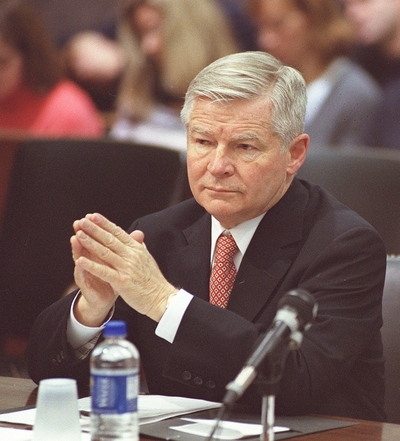WHEN William Bulger became president of the University of Massachusetts in 1995, I remarked that his Beacon Hill had been one long gorging at the public trough. "By now," I wrote in this space, "the dollars he has extracted to enrich himself and his relatives must run well into seven figures."
 To anyone with eyes to see, William Bulger was unethical and untrustworthy, the last man who should have been entrusted with running a university. |
After last week's larceny, it may be time to update that estimate. Between the $960,000 severance deal and an annual pension of at least $240,000 (but "there are a lot of complicating factors that could make it even higher," the state treasurer's office says), the total Bulger take must surely be nearing the eight-figure mark — if it hasn't passed it already.
Maybe it's not be fair to describe Bulger's obscene retirement package as larceny. Is it stealing if they give it to you willingly? "There was no negotiation," UMass trustee Lawrence Boyle, the board's lone dissenter, told The Boston Globe. "We simply accepted the number his lawyer presented to us." That was true to form; the trustees have been kissing Bulger's ring since the day his name first surfaced as a candidate for the job.
Fortunately, Governor Romney isn't quite so willing to swallow whatever the departing UMass president (or his lawyer) ladles out. That golden handshake is typical of the Beacon Hill attitude that government is about "self service, rather than public service," Romney told me the day after Bulger resigned. "A million-dollar severance payment is too much. He shouldn't have asked for it and the board shouldn't have given it."
Whether the trustees can be persuaded to pare Bulger's jackpot to something less egregious may depend on how loud the public outrage grows. Certainly a governor who doesn't even take a salary has the moral authority to channel some of that outrage. And there is good recent precedent for doing so: When Governor Swift criticized as excessive the severance deal offered to Virginia Buckingham, who resigned as executive director of Massport after the 9/11 attacks, the Massport board quickly renegotiated a package that was 25 percent lower.
Meanwhile, Romney wants the trustees to see to it that Bulger signs no contracts and hands out no raises in the few weeks left before his resignation takes effect. "There should be no racing around taking care of friends," he says bluntly. He doesn't add, because he doesn't need to, that it would be perfectly in keeping with Bulger's ethics to do exactly that.
Nobody worried very much about Bulger's ethics when he was crowned president of UMass eight years ago. His vengefulness, his avarice, his petty cruelties, his arrogance — those were of no more concern to the establishment that hailed the new academic caesar than his lack of scholarly credentials or the fact that the public disliked him. With the exception of then-Treasurer Joe Malone, who always had Bulger's number, the official consensus was that the new president would be good at shaking the money tree, and what else did the university really need?
The right answer, then as now, was: A person of integrity, someone of incorruptible character whose appointment would reflect honor on the institution. No one should have confused Bulger with such a person — least of all the man whose endorsement essentially handed him the job: Governor Weld.
It was Weld, after all, who'd had nothing but scorn for Bulger when he first ran for governor in 1990. The Massachusetts political culture was "rotten to the core," Weld said, and he identified Bulger, then the state Senate president, as a leading source of the rot. A former federal prosecutor, Weld had better reason than most to disdain Bulger: his steadfast refusal to denounce or even acknowledge the savageries of his older brother, the gangster and accused serial murderer James "Whitey" Bulger.
But once Weld settled into office, he stopped worrying about decency in public life. He recast himself as Bulger's buddy, going so far as to campaign with him on Election Day 1994 and calling himself "Senator Bulger's campaign manager." He merrily took part in Bulger's St. Patrick's Day roasts, even singing and making jokes with him about Whitey, who became a fugitive in January 1995. Weld's ethical tone-deafness was appalling, but he was beyond caring. When the UMass presidency opened up a few months later, Weld made it clear that Bulger was his choice.
But he was a rotten choice. The public knew it, even if Weld and the ring-kissing trustees didn't. In a statewide poll, 59 percent of the public opposed making Bulger the UMass president; only 20 percent were in favor. At that point, of course, no one knew that Bulger had secretly been in touch with his brother, or that he'd advised him not to surrender to the law. It wasn't necessary to know. As the search for his successor gets underway, no credential matters more than integrity.
(Jeff Jacoby is a columnist for The Boston Globe).
-- ## --
Follow Jeff Jacoby on Twitter.
Discuss his columns on Facebook.
Want to read more? Sign up for "Arguable," Jeff Jacoby's free weekly email newsletter.

